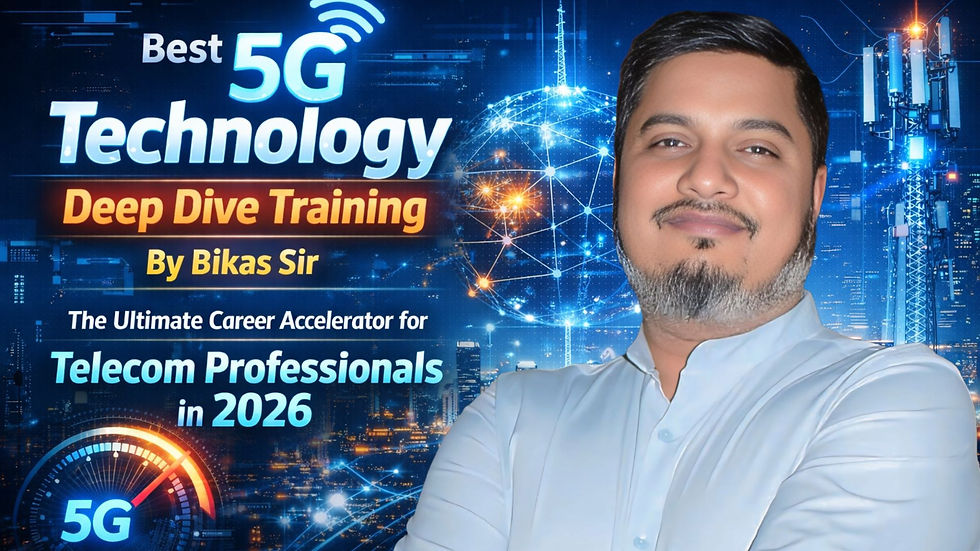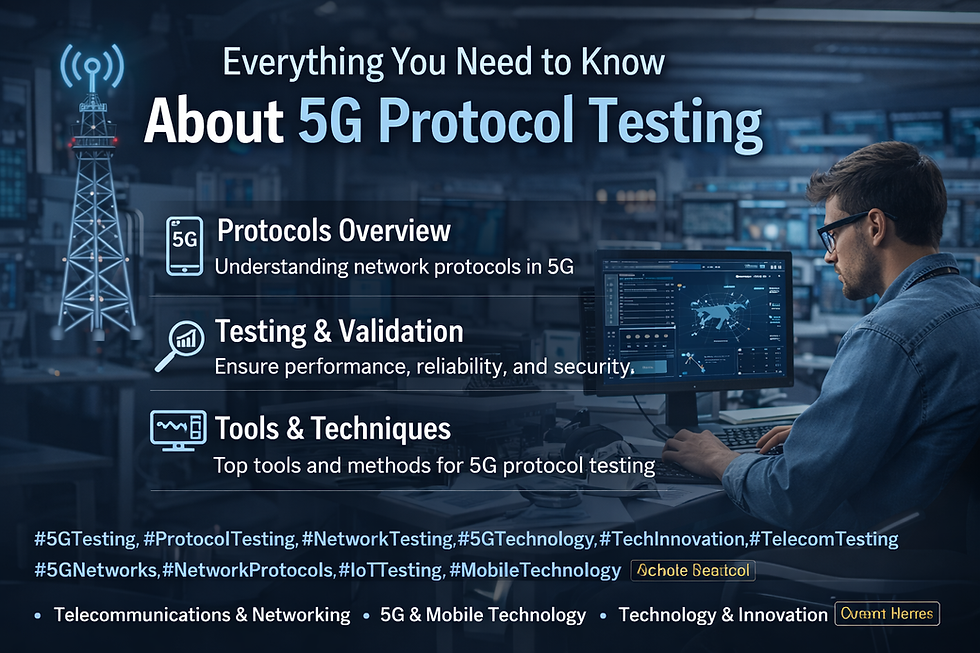How 5G Telco Cloud is Shaping the Future of Smart Technologies in 2024
- Sameer Krishn
- Jun 28, 2024
- 6 min read

Table of Contents
Introduction: The Convergence of 5G and Cloud Computing
Technological Foundations of 5G Telco Cloud
Transforming Smart Technologies in 2024
Challenges and Considerations
Future Trends and Opportunities
Conclusion: Embracing the 5G Telco Cloud Revolution
Introduction: The Convergence of 5G and Cloud Computing
In 2024, the convergence of 5G technology and cloud computing is poised to redefine the landscape of smart technologies, ushering in a new era of unprecedented connectivity, real-time data processing, and intelligent automation. This transformative approach, known as 5G Telco Cloud, integrates the high-speed, low-latency capabilities of 5G networks with the scalability and flexibility of cloud infrastructure, enabling a wide range of innovative applications and use cases across various industries.
From smart homes and connected living to autonomous vehicles and intelligent manufacturing, 5G Telco Cloud is set to revolutionize the way we interact with and leverage technology in our daily lives. In this comprehensive blog post, we will explore the technological foundations of 5G Telco Cloud, its transformative impact on smart technologies, the challenges and considerations surrounding its adoption, and the future trends that will shape the landscape of smart technologies in 2024 and beyond.
Technological Foundations of 5G Telco Cloud
Evolution from 4G to 5G
The transition from 4G LTE to 5G marks a significant leap in wireless communication standards, characterized by enhanced speed, lower latency, and greater capacity. Unlike its predecessors, 5G is designed not just to connect people, but also to interconnect devices, machines, and entire infrastructures through a robust, scalable network architecture.
5G's core technological advancements include increased bandwidth, reduced latency, and support for massive device connectivity. These improvements enable a wide range of applications, from high-definition video streaming and real-time gaming to mission-critical IoT deployments and remote healthcare services. By seamlessly integrating with cloud computing resources, 5G Telco Cloud further enhances these capabilities, empowering smart technologies to reach new heights of performance and efficiency.
Internet of Things (IoT) Advancements
The combination of 5G's massive IoT connectivity and cloud computing capabilities enables the deployment of large-scale IoT solutions across various sectors, including smart homes, smart grids, autonomous vehicles, and industrial automation. IoT devices equipped with 5G connectivity can collect and transmit real-time data for predictive maintenance, environmental monitoring, and smart resource management, improving operational efficiency and enhancing the user experience.
5G Telco Cloud's ability to support a vast number of connected devices, coupled with its low-latency communication and cloud-based data processing, unlocks new possibilities for smart technologies. This convergence empowers businesses, governments, and individuals to make more informed decisions, optimize resource utilization, and automate critical processes, ultimately transforming the way we interact with and manage our environments.
Transforming Smart Technologies in 2024
Smart Homes and Connected Living
The integration of 5G Telco Cloud is set to revolutionize the smart home experience in 2024. With its high-speed, low-latency connectivity and cloud-based intelligence, 5G Telco Cloud enables seamless integration and real-time control of a wide range of smart home devices, from intelligent appliances and home automation systems to security cameras and personal assistants.
Homeowners can leverage 5G Telco Cloud to remotely monitor and manage their homes, receive real-time alerts, and optimize energy consumption. Smart home devices can communicate with each other and the cloud, enabling predictive maintenance, personalized recommendations, and enhanced user experiences. This level of connectivity and automation empowers homeowners to live more efficiently, conveniently, and sustainably, transforming the way we interact with our living spaces.
Smart Grids and Energy Management
The 5G Telco Cloud also plays a pivotal role in the development of smart grids, revolutionizing the way we generate, distribute, and consume energy. By integrating 5G-enabled sensors and cloud-based analytics, smart grids can monitor and optimize energy usage, predict and respond to fluctuations in demand, and seamlessly integrate renewable energy sources.
With 5G Telco Cloud, utility providers can remotely monitor and control grid infrastructure, detect and address issues in real-time, and enable dynamic pricing and demand response programs. Consumers, on the other hand, can gain greater visibility and control over their energy consumption, empowering them to make more informed decisions and contribute to a more sustainable energy ecosystem.
Autonomous Vehicles and Intelligent Transportation
The 5G Telco Cloud is also transforming the future of transportation, enabling the development of advanced autonomous vehicle technologies and intelligent transportation systems. The low latency and high bandwidth of 5G, combined with the cloud's computing power, allow for seamless vehicle-to-everything (V2X) communication, real-time data processing, and coordinated decision-making among vehicles, infrastructure, and pedestrians.
In 2024, 5G Telco Cloud-powered autonomous vehicles will be able to navigate roads more safely and efficiently, with the ability to detect and respond to changing conditions, communicate with traffic signals and other infrastructure, and coordinate their movements to reduce congestion and optimize traffic flow. This integration of smart technologies will pave the way for a more sustainable, efficient, and accessible transportation ecosystem.
Industrial Automation and Smart Manufacturing
The 5G Telco Cloud is also revolutionizing the manufacturing and industrial automation sectors, enabling the development of smart factories and intelligent production processes. By leveraging the ultra-reliable, low-latency communication (URLLC) capabilities of 5G, industrial IoT devices can transmit real-time data for predictive maintenance, robotic automation, and quality control, enhancing operational efficiency and responsiveness.
With 5G Telco Cloud, manufacturers can implement advanced analytics, remote monitoring, and autonomous decision-making, allowing them to optimize production, reduce downtime, and quickly adapt to changing market demands. This transformation towards smart manufacturing not only improves productivity and competitiveness but also enables more sustainable and efficient use of resources, contributing to the overall environmental and economic well-being of the industry.
Challenges and Considerations
Security and Privacy Concerns
The widespread adoption of 5G Telco Cloud and its integration with smart technologies raises important concerns regarding data security and privacy. As smart devices and systems collect and transmit vast amounts of sensitive information, it is crucial to implement robust cybersecurity measures and data governance frameworks to protect against cyber threats and unauthorized access.
Telecom providers, technology companies, and policymakers must work collaboratively to address these challenges, ensuring that the benefits of 5G Telco Cloud-powered smart technologies are balanced with the necessary safeguards to protect individual privacy and critical infrastructure from cyber attacks.
Infrastructure Deployment and Coordination
The successful implementation of 5G Telco Cloud and its integration with smart technologies also requires significant investment and coordination among various stakeholders, including telecom providers, technology companies, city authorities, and regulatory bodies.
Deploying the necessary 5G network infrastructure, cloud computing resources, and IoT devices across urban and industrial environments presents logistical and financial challenges that must be addressed through collaborative efforts and strategic planning. Ensuring seamless integration, interoperability, and scalability of these systems is crucial for realizing the full potential of 5G Telco Cloud in transforming smart technologies.
Future Trends and Opportunities
Artificial Intelligence and Machine Learning
As 5G Telco Cloud continues to shape the future of smart technologies, the integration of Artificial Intelligence (AI) and Machine Learning (ML) will play a pivotal role in unlocking new capabilities and enhancing the user experience. The combination of 5G's low latency, high bandwidth, and cloud-based computing power will enable real-time data processing and intelligent decision-making across a wide range of smart technology applications.
AI-powered smart home assistants, predictive maintenance systems in industrial automation, and autonomous vehicle navigation are just a few examples of how the convergence of 5G Telco Cloud and AI/ML will transform the way we interact with and leverage smart technologies in 2024 and beyond.
Edge Computing and Distributed Intelligence
Another emerging trend in the 5G Telco Cloud ecosystem is the rise of edge computing, which brings computational resources and data processing closer to the source of data generation. By leveraging edge devices and distributed intelligence, smart technologies can respond to real-time events, reduce latency, and enhance privacy and security, as sensitive data can be processed locally rather than being transmitted to the cloud.
The integration of edge computing with 5G Telco Cloud will enable smart technologies to make more autonomous decisions, adapt to changing conditions, and provide a more seamless and responsive user experience. This convergence of edge and cloud computing will be a key driver in the continued evolution and widespread adoption of smart technologies in the years to come.
Conclusion: Embracing the 5G Telco Cloud Revolution
The convergence of 5G technology and cloud computing, known as 5G Telco Cloud, is poised to revolutionize the landscape of smart technologies in 2024 and beyond. By enabling unprecedented connectivity, real-time data processing, and intelligent automation, 5G Telco Cloud is transforming the way we interact with and leverage smart home systems, smart grids, autonomous vehicles, and industrial automation.
As we embrace this technological revolution, it is crucial to address the challenges and considerations surrounding data security, privacy, and infrastructure deployment. By fostering collaboration among telecom providers, technology companies, and policymakers, we can ensure that the benefits of 5G Telco Cloud-powered smart technologies are realized in a responsible and sustainable manner.
The future of smart technologies is bright, and the integration of 5G Telco Cloud, Artificial Intelligence, and edge computing will continue to drive innovation, enhance user experiences, and contribute to a more sustainable and efficient world. By staying at the forefront of these technological advancements, businesses, governments, and individuals can unlock new opportunities and shape the future of smart technologies in 2024 and beyond.
Internal URLs:
Apeksha Telecom's training programs: https://www.apekshatelecom.com/training
Apeksha Telecom's placement assistance: https://www.apekshatelecom.com/placement-assistance
External URLs:
Telecom Gurukul: https://www.telecomgurukul.com
Reference URLs:
"How 5G Telco Cloud is Shaping the Future of Smart Technologies in 2024" - Apeksha Telecom: https://www.telecomgurukul.com/post/how-5g-telco-cloud-is-shaping-the-future-of-smart-technologies-in-2024




Comments